KCATA Team Defends International Title
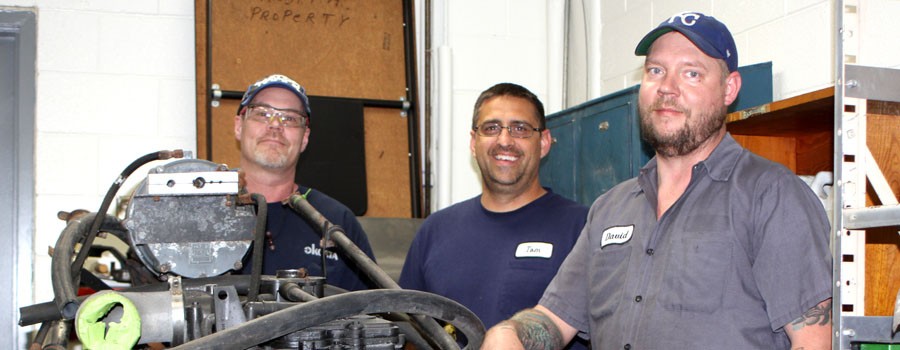
Together, Tom Seymour, Jeff Clark and Dave Fergason have spent a lifetime under the hood.
Combined, the three KCATA mechanics have worked on cars, trucks and buses for more than 60 years.
Now, they’re taking their prowess with a torque wrench to the International Bus Roadeo in Charlotte, N.C., where they will defend the maintenance championship won by the KCATA last year.
Seymour and Clark are returning to the championship this week after finishing among the top three in the local roadeo competition last fall. They will be joined by Fergason, a newcomer to the team after edging out a mechanic on last year’s championship squad in the local qualifying competition.
No one on the three-man team is showing any signs of the jitters as they spend their lunch hours and break time pouring over technical manuals and reinforcing their expertise in various engine components as they prepare for this weekend’s Olympics of transit.
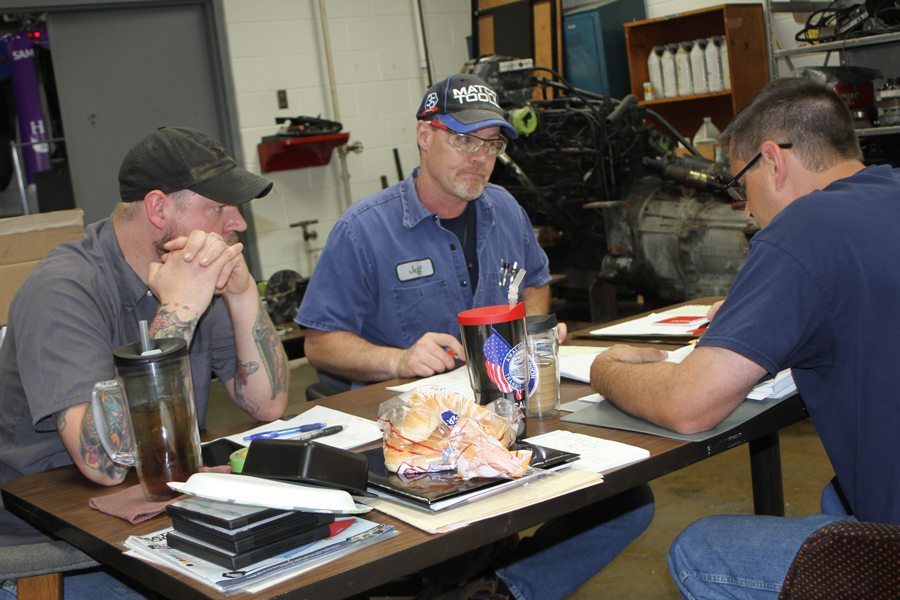
The team holds study hall over lunch hour to ready for the 2016 International Bus Roadeo.
“If everything goes as smoothly and flows like it did last year,” Clark said, “I think it will go really well.”
The competition, held by the American Public Transportation Association, will test the mechanics’ abilities to troubleshoot problems and fix them quickly – no easy task given that buses are now a complex mix of electricity and mechanics that require more experience and know-how than ever before.
Here’s a look at the background of the three KCATA technicians who will defend the mechanical pride of Kansas City when they travel to Charlotte for the International Competition:
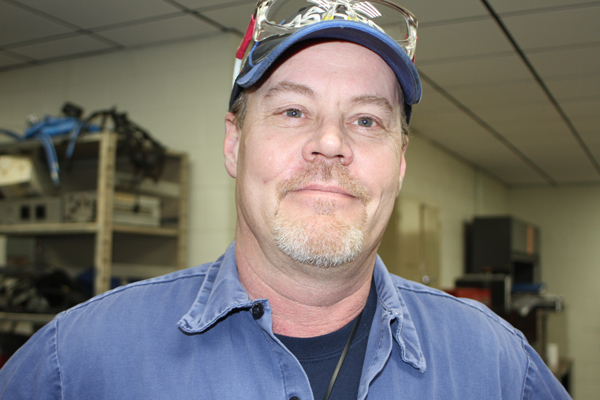
Jeff Clark
Age: 52
How long a mechanic? 32 years, 18 at the KCATA.
How did you become a mechanic? Dad was a truck driver for 42 years. He had an uncle who was an engineer who worked on Saturn rockets for NASA. “It’s not like you really choose it. You just grow up fixing stuff. You can’t really afford to take and fix it, so you just figure out how to fix it yourself.”
Do you work on friends’ cars? “I did for a long time, but my back and hands hurt so bad any more I just can’t do a lot of it. I will do brake jobs for the family. I can’t do it all, but I do as much as I can to help.”
What makes a good mechanic? “The ability to listen. God gave you two ears and one mouth and there’s a reason for that. I didn’t come into any of this knowing everything. There comes a time when you’ve got to ask somebody something. Every individual has something to offer. I really believe that.”
How has technology changed being a mechanic? “The basic nucleus of the engine is still an internal combustion engine. That hasn’t changed a whole lot. Everything outside of that is all computerized. I started in an era when it was just fuel, air and combustion and you would make it run. Today, it’s not as easy to do because everything is monitored. There’s a sensor everywhere.”
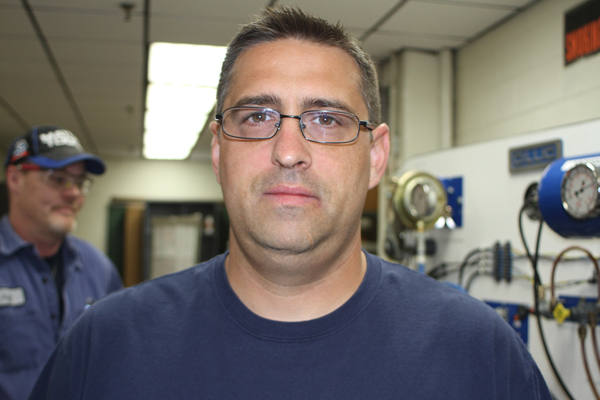
Tom Seymour
Age: 39
How long a mechanic? 14 years, 11 at the KCATA.
How did you become a mechanic? Started changing tires and oil at Hertz. Later moved up to mechanic after taking a year of classes full time at Northland Career Institute in Platte City.
Do you work on your own car? “As little as I can because I do it all day down here. I’ll do it to save money, but I’m not apt to work on cars at home because I enjoy working on cars. It’s my job.”
What makes a good mechanic? “A mechanical understanding of how things work and the ability to question. A good mechanic will ask somebody else if they don’t know rather than just assuming they know everything.”
How has technology changed being a mechanic? “It’s made things more complicated at times. You’re dealing with more electronics than you were before. We’re having to do more electronic diagnosis and repair. I don’t find it as complicated because of the time period I grew up in. In the time I started learning mechanics, it was already headed in that direction.”
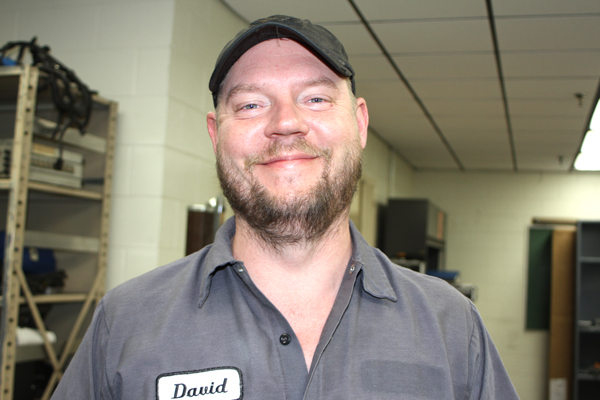
Dave Fergason
Age: 36
How long a mechanic? 16 years, two at the KCATA.
Why did you become a mechanic? “So I didn’t have to sit in a cubicle.”
Where did you get your earliest motivation to be a mechanic? “Probably, my dad. He didn’t like to pay top-dollar to get his stuff fixed, so he fixed it himself. That’s how you learn.”
Do you work on your own car? “When I need to. Not very often. General maintenance, oil change spark plugs. My stuff doesn’t break down.”
How has technology changed being a mechanic? “It makes engine and transmission diagnostics a lot easier. Now, we have a computer that gives us a little more insight into what’s going on. Before everything was mechanical and not electrical.”
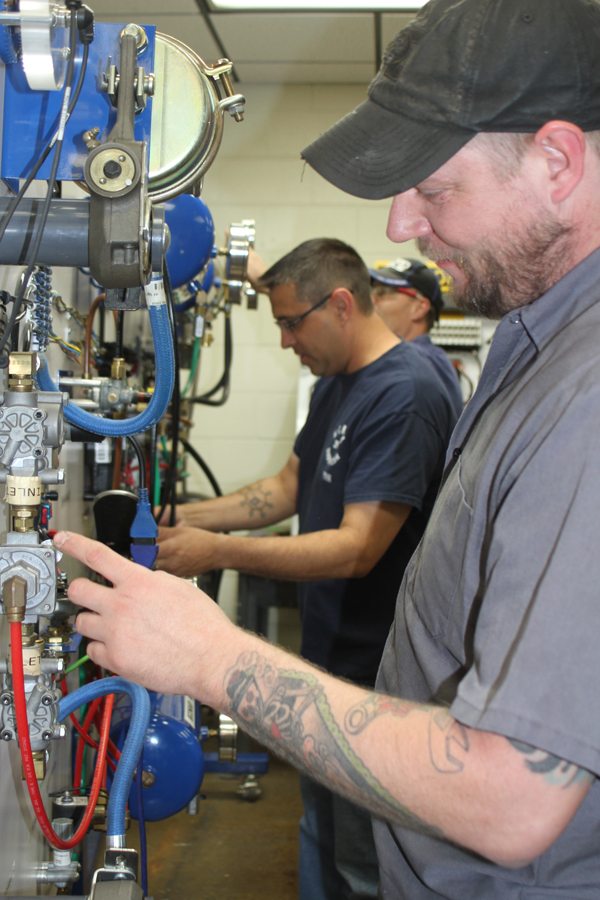
The KCATA team practices for the Roadeo.